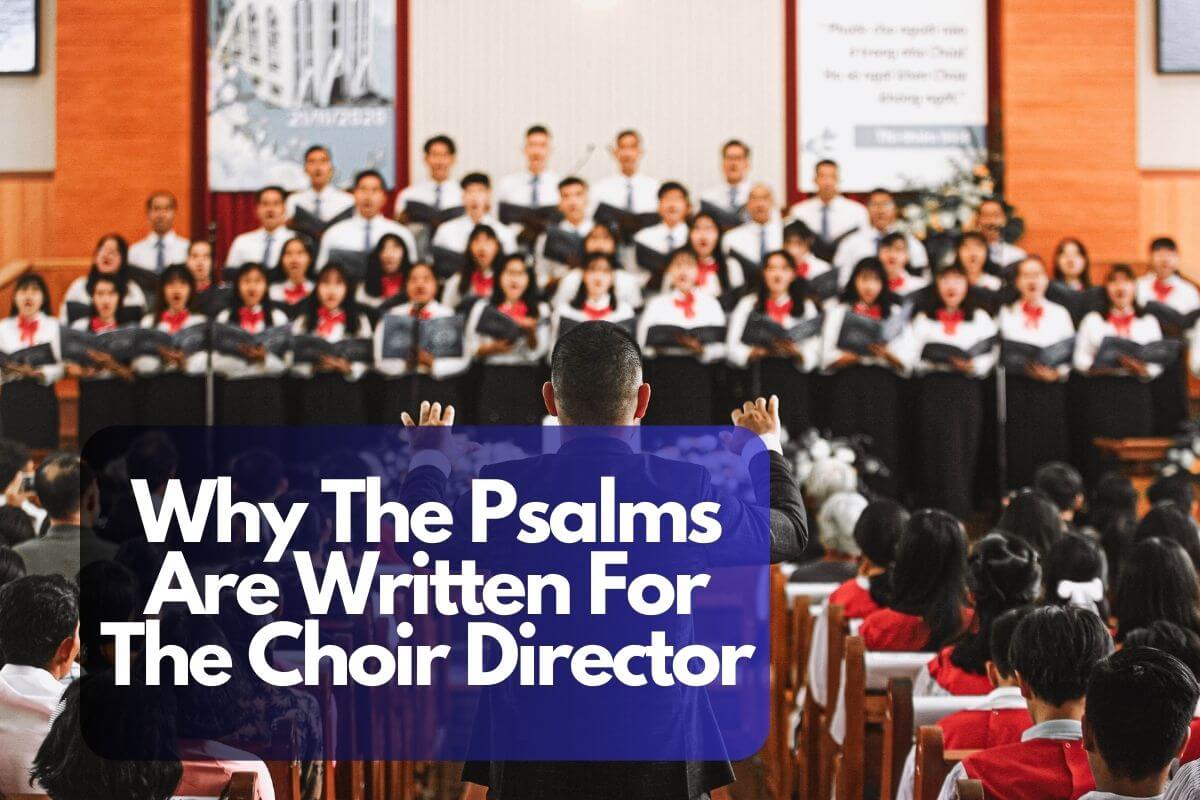The Psalms are an exceptional collection of ancient poetic hymns found in the Bible. Among their unique features is the frequent mention of being written “For the Choir Director” or “To the Chief Musician.” This intriguing phrase raises questions about the purpose and intended audience of these beautiful compositions.
In this article, we will explore why the Psalms were written specifically for the choir director, uncovering insights into their historical context, their role in worship, and their enduring relevance for both ancient and modern audiences. Join us as we delve into the significance of this unique attribution and gain a deeper appreciation for the Psalms as timeless expressions of faith and praise.
Why The Psalms Are Written For The Choir Director
Here are a few reasons why the Psalms were written for the choir director:
Musical Accompaniment: The Psalms were often accompanied by musical instruments, and the choir director played a crucial role in leading and coordinating the musicians. The psalm headings sometimes mention the use of specific instruments, such as the harp, lyre, or trumpet.
Liturgical Worship: In ancient Israel, the worship rituals were highly structured and involved the participation of the community. The Psalms were an integral part of these liturgical practices, and the choir director served as a guide in leading the congregation in singing and praising God through the Psalms.
Preservation of Tradition: The choir director had a responsibility to ensure that the Psalms were performed correctly and in accordance with established traditions. They were responsible for teaching and passing down the melodies, lyrics, and proper execution of the Psalms from one generation to the next.
Artistic Direction: The choir director provided artistic direction, helping to shape the musical interpretations of the Psalms. They may have made decisions regarding the tempo, dynamics, and arrangement of the music to enhance the worship experience and convey the intended emotions of the psalmist.
Teaching and Instruction: The choir director was also a teacher, instructing the choir members and the congregation in the performance of the Psalms. They would have taught the melodies, harmonies, and proper pronunciation of the Hebrew text, ensuring that the songs were sung with accuracy and devotion.
The attribution of the Psalms to the Choir Director is a distinctive feature that sets them apart from other biblical texts. Throughout the Psalms, we often encounter phrases such as “To the Chief Musician” or “For the Choir Director.” This unique designation raises questions about the intended audience and purpose of these poetic compositions.
The purpose of this article is to delve into the reasons behind this attribution and explore its significance in understanding the Psalms. By unraveling the historical and cultural context surrounding the Psalms and the role of the Choir Director, we aim to gain deeper insights into the intended use, impact, and relevance of these ancient hymns. Understanding why the Psalms were written for the Choir Director can provide us with a richer appreciation of their role in worship and their enduring value for both ancient and modern audiences.
Historical Context of the Psalms
The Psalms are a collection of ancient Hebrew poetry and worship songs. They form an integral part of the Old Testament and are attributed to various authors, including King David. These poetic compositions express a wide range of emotions, including praise, lament, thanksgiving, and supplication. The Psalms served as a means of connecting with God, expressing the deepest longings of the human heart, and offering communal worship.
Music and singing held great significance in ancient Israelite culture. They were integral to religious ceremonies, festive occasions, and daily life. Singing and musical instruments were used to worship and praise God, recount historical events, and convey spiritual messages. The power of music to evoke emotions and create a sense of unity and reverence made it an essential component of Israelite worship.
In the context of temple worship, the position of the Choir Director played a vital role in leading and organizing the musical aspects of the worship service. The Choir Director was responsible for coordinating the singers and musicians, directing the choir, and ensuring the proper execution of musical offerings. They worked closely with the psalmists and composers of the Psalms to bring the words and melodies to life, creating a harmonious and uplifting worship experience for the congregation. The Choir Director’s expertise and leadership were essential in facilitating a seamless integration of music and prayer in the temple rituals.
The Role Of The Choir Director
The Choir Director held significant responsibilities and duties within the context of worship. They were responsible for leading the choir and musicians, ensuring the proper execution of musical performances, and maintaining the overall musical quality of the worship experience. The Choir Director’s expertise in music theory, vocal techniques, and instrumental coordination allowed them to guide the musical aspects of the worship service effectively.
The role of the Choir Director involved collaboration with the psalmist or composer of the Psalms. The Choir Director worked closely with the psalmist to understand the intended musical expression and convey the emotions and messages embedded within the poetic lyrics. This collaboration ensured that the Psalms were rendered in a way that captured the essence and intention of the original compositions.
Musical leadership in worship was of paramount importance. The Choir Director played a crucial role in setting the tone, mood, and atmosphere of the worship service through the selection of appropriate Psalms, musical arrangements, and the direction of the choir and musicians. Their ability to lead the congregation in singing and create a cohesive musical experience enhanced the spiritual engagement and participation of worshippers. The Choir Director’s guidance and expertise in music brought an added dimension of beauty and reverence to the worship of God.
Worship And Musical Context Of The Psalms
The Psalms held a central role in ancient temple worship. They were recited, chanted, or sung as a collective expression of praise, adoration, confession, and supplication to God. The Psalms provided a means for the community to engage with God, offering a framework for both individual and communal worship experiences. They served as a guide for expressing heartfelt emotions and connecting with the divine.
The Choir Director played a pivotal role in the musical interpretation of the Psalms. They worked closely with the psalmist to understand the intended mood, melody, and rhythm of the Psalms. Through their expertise in music, the Choir Director brought the Psalms to life by selecting appropriate musical arrangements, determining harmonies, and leading the choir and musicians in a coordinated performance. Their contribution added depth and richness to the worship experience, amplifying the impact of the Psalms on the congregation.
The Psalms were instrumental in creating a meaningful worship experience. Through their poetic and lyrical expressions, they connected worshippers with God, providing a platform to express their deepest spiritual longings, joys, sorrows, and praises. The role of the Choir Director in translating these words into harmonious melodies and engaging musical performances enhanced the power of the Psalms to evoke emotions, foster unity, and facilitate a profound encounter with the divine. The Psalms, in conjunction with the guidance of the Choir Director, became a transformative medium for worship, inviting worshippers into a deeper communion with God.
Relevance And Application Today
The Psalms continue to hold profound relevance today. Their themes of praise, lament, thanksgiving, and trust in God resonate with the human experience across cultures and generations. The Psalms address the full range of human emotions and provide a language for expressing our deepest thoughts and feelings to God. Their timeless wisdom and poetic beauty make them a valuable resource for individuals and communities seeking to connect with God in meaningful ways.
The Psalms can inspire and guide modern worship practices. They offer a rich tapestry of poetic expressions, providing a foundation for crafting prayers, songs, and liturgies that reflect the diversity of human experiences and emotions. The Psalms teach us to approach God authentically, pouring out our hearts and seeking His presence. They remind us of God’s faithfulness, His sovereignty, and His unfailing love, encouraging us to trust in Him amidst life’s challenges.
There are various ways to incorporate the Psalms into contemporary musical worship. They can be adapted into songs, allowing their poetic verses to be set to melodies that resonate with worshippers today. The Psalms can also be recited or read aloud as responsive readings, engaging the congregation in a collective expression of worship. Additionally, the themes and messages of the Psalms can inform the selection of worship songs and serve as a source of inspiration for songwriters, helping to shape the lyrical content of contemporary worship music.
By incorporating the Psalms into our worship practices today, we tap into the rich heritage of praise and adoration that has been cherished for centuries. The Psalms provide a timeless connection to the worship of ancient Israel and offer a pathway for encountering God’s presence in our modern worship gatherings.
Conclusion
It is evident that the role of the Choir Director was crucial in bringing the Psalms to life through music and leading the congregation in worship. Their expertise in musical leadership helped create a meaningful and transformative worship experience for the community.
As we consider the relevance of the Psalms in contemporary worship, we recognize their enduring value and universal themes that continue to resonate with people today. The Psalms provide a rich source of inspiration, guiding us in expressing our deepest emotions and connecting with God in authentic ways.
In various worship settings, whether in traditional or contemporary contexts, the Psalms offer a powerful means of engaging with God through music and heartfelt expression. Their beauty, wisdom, and spiritual depth continue to impact individuals and communities, allowing us to draw near to God and find solace, joy, and strength in His presence.
May we continue to embrace the Psalms as a treasured resource for worship, allowing their timeless words to shape our praise, prayers, and encounters with the living God.







